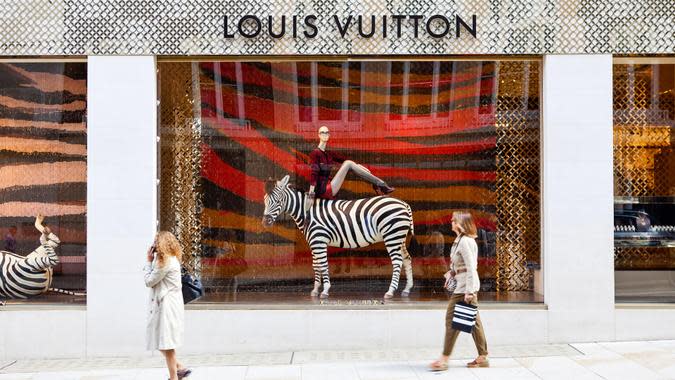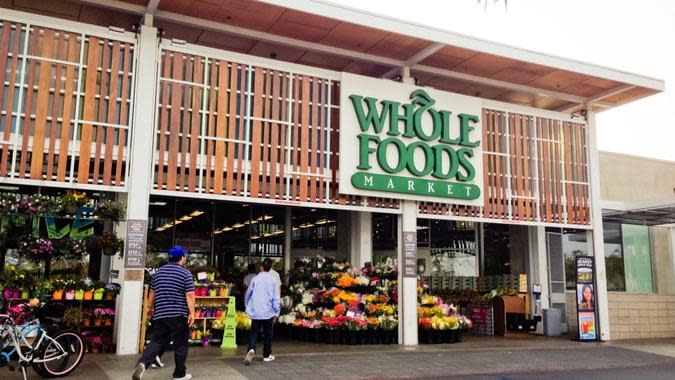Cut Expenses for Inflation: 6 Types of Stores To Stop Buying From To Save Money

Life is getting more and more expensive with inflation. Everything seems to be increasing in price, including food, clothing, household items and more. While some expenses are unavoidable, saving money is possible by avoiding certain stores that tend to mark up their products significantly.
Read Next: 7 Healthy Grocery Items Frugal People Buy at Aldi
Explore More: How To Get $340 Per Year in Cash Back on Gas and Other Things You Already Buy
Keep reading as we look at some stores you should avoid if you want to save money and keep your budget in check. We’ll also give you some alternatives for where you can shop instead.

High-End Outlets
When you think of an “outlet,” you probably think you’re saving money. However, high-end outlets are still expensive.
Sometimes, these clothing items are barely marked down in price. The store may mark up the item on the tag and then mark it down to fool customers into thinking they are saving more money than they are.
Trending Now: 6 Expensive Grocery Items Even Frugal People Buy
Find Out: 5 Food Items You Should Always Buy at Walmart
Sponsored: Credit card debt keeping you up at night? Find out if you can reduce your debt with these 3 steps

Boutique Clothing Stores
Boutique clothing stores present a fun and unique shopping experience. Plus, you’re often supporting a small local business instead of a chain store.
However, prices at boutique clothing stores are frequently higher since the store needs to make up for its small quantity by selling expensive pieces. To save money, you should almost always avoid shopping at a boutique clothing store.
For You: 8 Healthy Grocery Items Frugal People Buy at Costco

Name-Brand Designer Stores
Name-brand designer items are usually costly. Whether it is clothing, purses, shoes, luggage or furniture, they are often much more expensive than their non-designer equivalents.
Before purchasing a name-brand designer item, ensure the item is worth the cost in quality. Spending money simply for the name-brand is an easy way to spend more than you should.

Convenience Stores
Convenience stores charge a premium for the convenience they provide. Many convenience stores carry a small selection of single-item foods, household items, personal items or other miscellaneous items you may need. To avoid overpaying for these items, keep your house well-stocked with essentials. This will help you avoid making frequent and expensive convenience store trips.
“Convenience stores offer a huge advantage — immediate access to a variety of items,” said David Reyes, founder of Reyes Financial Architecture. “But that convenience comes at a hefty price. Individual items are marked up significantly compared to supermarkets or discount stores. There’s also the temptation to grab unplanned snacks and drinks, further inflating your bill.”

Whole Foods
Whole Foods gets its own spot on this list for its notorious reputation as a budget breaker. Nicknamed “Whole Paycheck” by many, it is known for being one of the most overpriced grocery stores in the country.
In 2017, Amazon purchased Whole Foods, which led to some overall price decreases, but it still remains very expensive. You can save money by buying the same products online or in person at other retailers.
Check Out: 5 Dollar Tree Items Frugal People Always Buy

Specialty Health Food Stores
Similar to Whole Foods, specialty health food stores sell expensive health foods. While you may be able to purchase multiple healthy snacks in one location, you’ll pay a price for it. Plus, since these specialty health food stores often have a smaller selection of curated items, it can be tempting to grab a new item to try, even when it wasn’t on your shopping list.
A better approach is to stick to specialty health food stores for specialty and hard-to-find items, and do all your regular grocery shopping at a cheaper grocery store.
“Stores specializing in organic, health food, or imported products often have a limited selection and higher prices,” said Reyes. “While the quality may be excellent, these stores might not be the most budget-friendly option for everyday groceries. Many mainstream supermarkets now offer organic and health food sections with competitive prices. Ethnic grocery stores can sometimes offer better deals on imported goods compared to specialty stores. Look for farmers markets for seasonal produce at a fraction of the cost.”

Where To Shop Instead
Instead of shopping at places like Whole Foods, specialty health food stores, high-end outlets, boutique clothing stores, name-brand designer stores and convenience stores, look for their cheaper alternatives.
Grocery stores like Aldi have lower prices because they offer less variety, have fewer employees, and don’t put as much effort into making their shelves look nice. The tradeoff, of course, is major savings for you.
You can also buy bulk from places like Costco to save money per item. You can get excellent deals on household goods like toilet paper, paper towels and tissues, and many food items. Just understand that the overall cost will be higher, but the per-unit price is almost always significantly less than most grocery stores.
Finally, consignment stores can be a great option for buying used clothing, furniture or kids’ items for a great price. Facebook Marketplace is another great place to find used items for less money.
More From GOBankingRates
This is One of the Best Ways to Boost Your Retirement Savings in 2024
6 Things You Should Never Do With Your Tax Refund (Do This Instead)
This article originally appeared on GOBankingRates.com: Cut Expenses for Inflation: 6 Types of Stores To Stop Buying From To Save Money